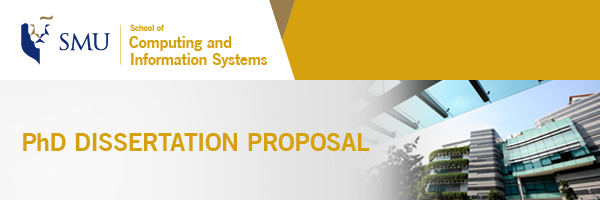| |
 |
|
| Quality Assurance in Software Engineering: A Journey Towards Explainable Automated Solutions |
|

|
Ratnadira WIDYASARI
PhD Candidate
School of Computing and Information Systems
Singapore Management University
|
| Research Area
Dissertation Committee
Research Advisor
Committee Members
|
|
|
| Date
18 December 2023 (Monday)
|
| Time
2:00pm - 3:00pm
|
| Venue
Meeting room 5.1, Level 5
School of Computing and Information Systems 1,
Singapore Management University,
80 Stamford Road
Singapore 178902
|
|
Please register by 17 December 2023.
We look forward to seeing you at this research seminar.

|
|
|
|
| About The Talk
In today's digital era, the pervasive influence of software on daily life underscores the necessity for high-quality and reliable systems. Software failures can result in substantial harm and financial losses, which highlights the pivotal role of Quality Assurance (QA) in Software Engineering. Given the significant role of Software Quality Assurance (SQA), many previous studies have proposed automated techniques in SQA to assist developers. While the prediction results of automated techniques in SQA are important, previous studies have also highlighted that explainability is also important. The dissertation proposal aims to develop explainable automated solutions in SQA. This dissertation proposal comprises five interconnected research studies. The initial two studies evaluated current automated techniques in SQA. The first study investigates biases in bug localization using the newly released Bugzbook dataset. Then, the second study evaluates Spectrum-Based Fault Localization (SBFL) family techniques in a Python real faults dataset (BugsInPy) that we built in a previous study, contrasting previous studies that focused on Java and C. The third study investigates the application of eXplainable Artificial Intelligence (XAI) in fault localization, which highlights that XAI can be used to enhance the performance of fault localization. The fourth work analyzes explanations within code review comments, providing deeper insights into the explanatory aspects of SQA activities. The fifth study introduces FuseFL for explainable fault localization. FuseFL utilizes Large Language Models (LLMs) alongside additional fault-related information to generate reasoning about faults.
|
|
| Speaker Biography
Ratnadira Widyasari is a PhD Candidate in Computer Science at the SMU School of Computing and Information Systems, supervised by Prof. David LO. Her main research interests are in the topic of artificial intelligence for software engineering, software debugging, and explainable software engineering.
|
|